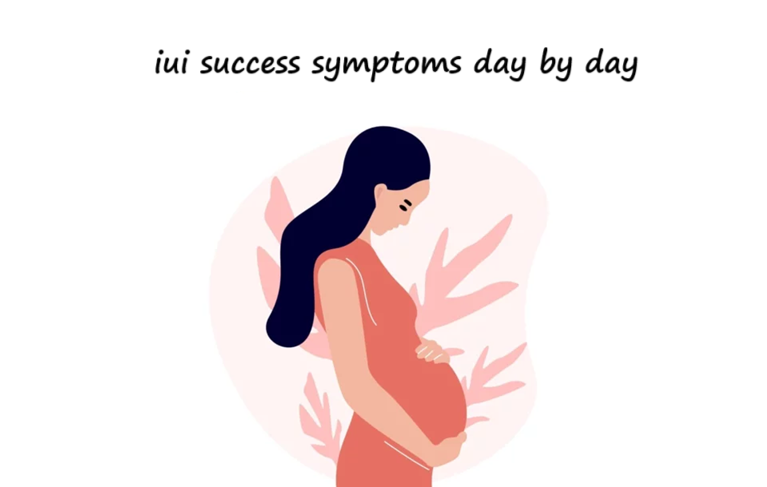Intrauterine Insemination (IUI) is a popular fertility treatment that helps couples struggling with conception. It involves placing washed and concentrated sperm directly into the uterus around the time of ovulation, increasing the chances of fertilization. After undergoing IUI, many women eagerly look for early signs of pregnancy, often analyzing every little change in their body.
While it’s natural to be curious, it’s important to remember that every woman’s body is different, and symptoms can vary widely. In this blog post, we’ll explore the possible IUI success symptoms day by day, helping you understand what to expect during the two-week wait (TWW) after the procedure.
Day 1-3 Post-IUI: The Initial Days
During the first few days after IUI, you may not notice any significant changes. However, some women report mild symptoms such as:
- Cramping: Light cramping is common as the uterus adjusts to the procedure.
- Spotting: A small amount of spotting may occur due to the catheter used during IUI.
- Fatigue: Hormonal changes can make you feel tired.
These symptoms are typically mild and should not cause concern. Focus on staying relaxed and maintaining a healthy lifestyle.
Day 4-6 Post-IUI: Early Signs
By this time, fertilization may have occurred if the timing was right. Some women may start noticing subtle changes, such as:
- Breast Tenderness: Hormonal shifts can cause your breasts to feel sore or sensitive.
- Mild Bloating: Progesterone levels rise after ovulation, which can lead to bloating.
- Increased Cervical Mucus: You may notice thicker or creamier discharge.
These symptoms are not definitive signs of pregnancy, as they can also occur during a regular menstrual cycle.
Day 7-9 Post-IUI: Implantation Window
If fertilization has occurred, the embryo will travel down the fallopian tube and implant into the uterine lining around this time. Some women may experience:
- Implantation Bleeding: Light spotting or pinkish discharge can occur when the embryo attaches to the uterine lining.
- Mild Cramping: Implantation can cause slight cramping, often described as a tugging or pulling sensation.
- Mood Swings: Hormonal changes may lead to emotional ups and downs.
Not all women experience implantation symptoms, so don’t worry if you don’t notice anything unusual.
Day 10-12 Post-IUI: Early Pregnancy Symptoms
As the embryo begins to produce hCG (human chorionic gonadotropin), some early pregnancy symptoms may start to appear:
- Fatigue: Rising progesterone levels can make you feel more tired than usual.
- Nausea: Some women may experience mild nausea or food aversions.
- Frequent Urination: Increased blood flow to the pelvic area can lead to more trips to the bathroom.
- Heightened Sense of Smell: Hormonal changes may make you more sensitive to odors.
These symptoms can be similar to premenstrual symptoms, so it’s important not to jump to conclusions.
Day 13-14 Post-IUI: The Two-Week Wait Ends
By this time, you can take a home pregnancy test or visit your doctor for a blood test to confirm pregnancy. Some women may notice:
- Missed Period: A missed period is one of the most common signs of pregnancy.
- Positive Pregnancy Test: If hCG levels are high enough, a home pregnancy test may show a positive result.
- Continued Symptoms: Fatigue, nausea, and breast tenderness may persist if you are pregnant.
Important Notes:
- Symptoms Vary: Not all women experience the same symptoms, and some may not notice any changes at all.
- False Symptoms: Progesterone, which is naturally high after ovulation, can cause symptoms that mimic pregnancy, even if conception hasn’t occurred.
- Stay Calm: The two-week wait can be emotionally challenging. Try to stay positive and avoid overanalyzing every symptom.
- Consult Your Doctor: If you experience severe pain, heavy bleeding, or other concerning symptoms, contact your healthcare provider immediately.
Tips for a Healthy Two-Week Wait
- Stay Active: Light exercise like walking or yoga can help reduce stress.
- Eat Well: Focus on a balanced diet rich in fruits, vegetables, and whole grains.
- Stay Hydrated: Drink plenty of water to support your body.
- Avoid Stress: Practice relaxation techniques like meditation or deep breathing.
- Avoid Testing Too Early: Testing before the two-week mark can lead to false negatives. Wait until at least 14 days post-IUI for accurate results.
Conclusion
The two-week wait after IUI can be an emotional rollercoaster, but understanding the possible symptoms day by day can help you navigate this period with more confidence. Remember, every woman’s journey is unique, and symptoms alone are not a definitive indicator of pregnancy. Stay patient, take care of yourself, and consult your doctor for accurate results and guidance.
Wishing you all the best on your fertility journey!



Leave a Reply